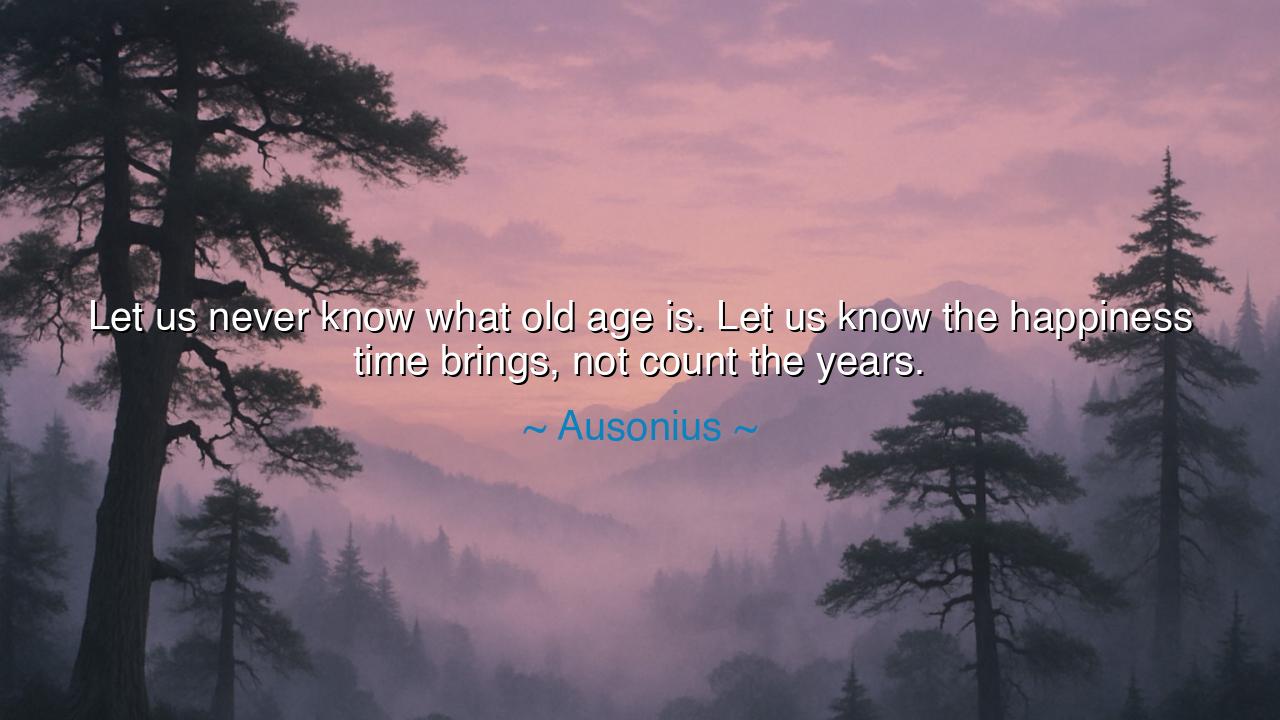
Let us never know what old age is. Let us know the happiness time
Let us never know what old age is. Let us know the happiness time brings, not count the years.






"Let us never know what old age is. Let us know the happiness time brings, not count the years." These words from Ausonius, an ancient Roman poet and teacher, offer us a vision of life that transcends the physical limitations often associated with aging. In this evocative statement, Ausonius suggests that we should not be concerned with the mere passage of time or the inevitable decay of the body that comes with age. Rather, he calls us to focus on the joys and happiness that life offers as we move through its stages. To count the years, to focus on old age as a looming burden, is to miss the richness and fulfillment that can be found in each passing moment, regardless of how many years have passed. Time, for Ausonius, is not something to be feared but something to be embraced, to be celebrated for the pleasures and wisdom it can bring.
In the teachings of the ancients, the idea of time was seen not as something linear and restricting, but as a natural flow, a river that moves steadily forward. Heraclitus, the Greek philosopher, famously stated, "You cannot step into the same river twice," reflecting the belief that time is ever-changing, constantly shaping and reshaping us. The Romans, too, acknowledged that while the body decays with age, the spirit has the potential to grow stronger, to become more attuned to the deeper truths of life. To age with dignity, as they saw it, was not to become weighed down by the inevitable decay of the body, but to continue to find meaning and purpose through the changing seasons of life. Ausonius’s sentiment echoes this ancient wisdom: to focus on the joy and happiness that time can bring, rather than counting the years that inevitably lead to old age.
The story of Socrates, the great Athenian philosopher, offers a powerful illustration of this view. Despite his advancing years, Socrates remained deeply engaged in the world, passionate about philosophy and the pursuit of truth. When faced with death, he did not mourn the loss of his physical life but embraced the opportunity for his soul to continue its journey. For Socrates, the essence of life was not measured by the number of years he had lived, but by the quality of the wisdom he had gained and the relationships he had formed. His life was a testament to the idea that time does not age the spirit, but rather, it provides the opportunity to grow deeper, to find meaning in the present, and to live joyfully in the moments that remain.
Consider also the life of Mahatma Gandhi, who, despite his later years, continued to be a force of inspiration and action. Gandhi’s focus was not on the physical limitations of aging but on the moral and spiritual growth that can occur at any stage of life. Even in his older years, Gandhi was deeply committed to his principles of nonviolence, truth, and justice, and his energy and spirit remained unwavering. He showed the world that old age need not be a time of decline, but a time of wisdom, reflection, and even continued action in the service of one’s higher ideals. Gandhi’s life is an embodiment of Ausonius’s call: to know the happiness that time brings, to continue growing and contributing regardless of how many years one has lived.
The true lesson of Ausonius’s words is that life is not measured by the number of years we accumulate, but by the quality of our experiences, the joy we bring to the present, and the meaning we create as we move through life. To dwell on the number of years that have passed is to waste the opportunity for joy, for each day, each moment, carries with it the potential for growth, happiness, and connection. The challenge is to live fully, to find the beauty in every stage of life, and to embrace time as an ally, not an enemy.
In practical terms, this means that as we grow older, we should not become preoccupied with counting the years or focusing on the limitations that come with age. Instead, we must nurture the joy that comes from living with purpose, from engaging in the activities that bring us happiness, from cultivating relationships that nourish our souls, and from continuing to learn and grow, regardless of how old we may become. We should seek to live with an open heart, savoring the present moment and all it has to offer, rather than looking back or worrying about the future.
Thus, as Ausonius teaches us, let us not measure our lives by the passing years, but by the richness of the moments we experience. Let us embrace the happiness that time brings, focusing not on what is fading, but on what is blooming in our lives. Let us live joyfully in every season, knowing that time, when approached with the right mindset, is not a burden but a gift—a gift that offers endless opportunities to grow, love, and live with purpose and meaning.






AAdministratorAdministrator
Welcome, honored guests. Please leave a comment, we will respond soon